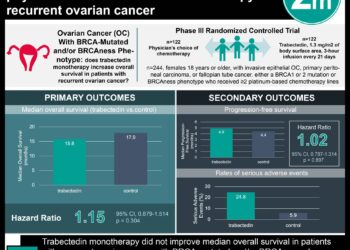Initial surgical aggressiveness may not improve ovarian cancer outcomes
1. In a retrospective review of over 600 patients with ovarian cancer, preoperative disease burden was the single most significant prognostic factor predicting survival following complete or minimal residual margins resection.
2. Surgical complexity was not found to be a significant predictor of survival in multivariable analysis.
Evidence Rating Level: 3 (Average)
Study Rundown: Ovarian cancer (OC) is the fifth most common cancer diagnosed in women, with over 20 000 cases in the United States estimated in 2015. OC is primarily managed with aggressive surgical cytoreduction and adjuvant chemotherapy. In the surgical management of OC, primary debulking surgery (PDS) with minimal residual margins of less than 1 cm (MR) is associated with improved survival. However, whether more aggressive procedures at the time of initial PDS improve outcomes, particularly among patients with extensive disease at diagnosis, remains unclear. The purpose of this study was to evaluate the relationship between preoperative disease burden and initial surgical aggressiveness on residual disease and survival following optimal PDS. A retrospective analysis of over 2600 patients with ovarian cancer were performed and compared the effect of disease distribution and complexity of surgery on overall survival. At the conclusion of the study, the authors demonstrated that total surgical resection was associated with an increased survival compared to MR; however, despite this, the most important prognostic factor in determining overall survival and progression free survival was initial disease burden. Furthermore, increased complexity of the surgery was not associated with increased survival. The study supports the use of total surgical resection in OC, however, the findings also questions the need for total surgical resection, particularly in cases with large initial disease burden requiring aggressive complex surgery with significant postoperative morbidity. However, the conclusions are limited by the retrospective study design and the lack of perioperative morbidity and mortality of this cohort.
Click to read the study in JCO
Relevant Reading: Survival effect of maximal cytoreductive surgery for advanced ovarian carcinoma during the platinum era: a meta-analysis
In-Depth [retrospective cohort]: In this study, patient data was collected from the Gynecologic Oncology Group- 182 case report forms database (GOG-182). Overall, 2655 patients diagnosed with histologically confirmed stage III or IV epithelial ovarian cancer or primary peritoneal cancer were included. All patients underwent PDS with either total surgical resection or minimal residual margins of <1cm (MR) and were then randomized to a platinum and paclitaxel-based chemotherapy regimen. There were no differences in survival among the different treatment arms. The primary outcomes were progression free survival (PFS) and overall survival (OS). At the conclusion of the study, patients treated with MR had significantly reduced PFS (15.3 versus 28.9 months; p<0.01) and OS (40.6 versus 76.9 months; p<0.01). Higher preoperative disease burden was associated with decreased PFS (15.1 versus 23.4 months, p<0.01) and OS (40.2 vs 70.8 months, p<0.01). In multivariable OS and PFS models, complexity of surgery was not an independent predictor of either outcome.
Image: PD
©2015 2 Minute Medicine, Inc. All rights reserved. No works may be reproduced without expressed written consent from 2 Minute Medicine, Inc. Inquire about licensing here. No article should be construed as medical advice and is not intended as such by the authors or by 2 Minute Medicine, Inc.







